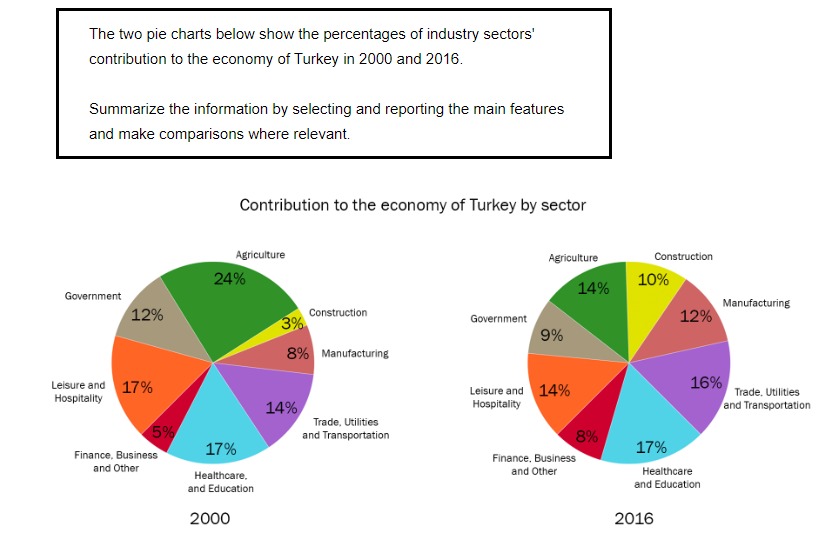Vivian Gia Linh
Aug 4, 2023
Writing Feedback / Writing task 1: The two pie charts below show the percentages of industry's sectors contribution [2]
The given pie charts give information about the proportions of industry factors' economical contribution of Turkey between 2000 and 2016.
Overall, it is clear that agriculture made up the largest proportion in 2000, then, health protection and education took the place in 2016.
Looking at the chart in more detail, Turkey recorded that agriculture contributed the largest proportion of the Turkish economy, at 24%, which was 10% higher than the corresponding figure for 2016. Meanwhile, construction made up the smallest proportion, as it accounted for 3% of the economy, and then grew to 7% in 2016 . Beyond that, the figure for manufacturing stood at 8%, which was 4% lower, compared to the same category in 2016. As for trade, utilities, and transport, this factor accounted for 14%, which rose slightly by 2% in 2016.
With regard to the rest sectors, healthcare and education remained stable, which stood at 17% in both years, whereas leisure and hospitality constituted the same proportion in 2000, but the corresponding figure for 2016 decreased to 14%. What's more, there was an inconsiderable increase from 5% to 8% in finance, business and other. Regarding the last sector, the figure for the government initially stood at 12%, which was 3% lower afterwards.
Industry and contribution for the turkish economy
The given pie charts give information about the proportions of industry factors' economical contribution of Turkey between 2000 and 2016.
Overall, it is clear that agriculture made up the largest proportion in 2000, then, health protection and education took the place in 2016.
Looking at the chart in more detail, Turkey recorded that agriculture contributed the largest proportion of the Turkish economy, at 24%, which was 10% higher than the corresponding figure for 2016. Meanwhile, construction made up the smallest proportion, as it accounted for 3% of the economy, and then grew to 7% in 2016 . Beyond that, the figure for manufacturing stood at 8%, which was 4% lower, compared to the same category in 2016. As for trade, utilities, and transport, this factor accounted for 14%, which rose slightly by 2% in 2016.
With regard to the rest sectors, healthcare and education remained stable, which stood at 17% in both years, whereas leisure and hospitality constituted the same proportion in 2000, but the corresponding figure for 2016 decreased to 14%. What's more, there was an inconsiderable increase from 5% to 8% in finance, business and other. Regarding the last sector, the figure for the government initially stood at 12%, which was 3% lower afterwards.

23.5.2020.png
